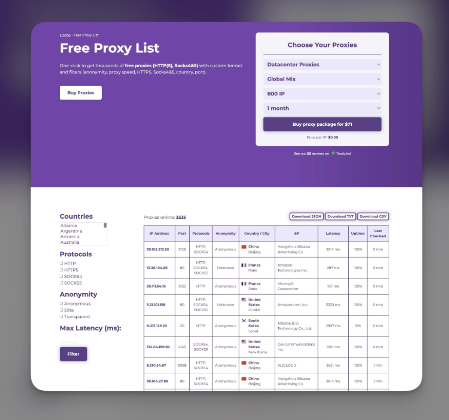
Using free proxy lists might seem like a convenient way to browse the internet anonymously or access geo-restricted content. However, these seemingly helpful tools come with a myriad of hidden dangers that can compromise your security, privacy, and overall online experience.

Contents
What Are Free Proxy Lists?
Free proxy lists are compilations of proxy servers available for public use without any cost. They allow users to reroute their internet traffic through different servers, masking their IP addresses. While this might offer a semblance of anonymity, it often lacks the necessary security measures to protect users from various cyber threats.
Security Risks
One of the most significant dangers is data interception. Malicious operators running these proxies can monitor and log your internet traffic. This means sensitive information like usernames, passwords, and credit card details can be stolen. According to a study by the University of California, over 79% of free proxies are insecure and susceptible to data breaches.
Privacy Concerns
Free proxies may collect your browsing data and sell it to advertisers or other third parties without your consent. This not only leads to targeted advertising but can also result in severe privacy breaches. Your online habits and preferences become commodities, eroding your personal privacy and exposing you to potential scams.
Malware and Viruses
Some free proxies are deliberately set up to distribute malware, spyware, or adware. When you connect through these proxies, malicious software can be injected into your device. This can lead to unauthorized access to your files, system slowdowns, and even identity theft. Tools like Malwarebytes can help detect and remove such threats, but prevention is always better than cure.
Lack of Encryption
Many free proxies do not support HTTPS connections, leaving your data unencrypted. Without encryption, your information is transmitted in plain text, making it easy for cybercriminals to intercept and read your data using simple tools like packet sniffers. This is especially dangerous when transmitting sensitive information over the internet.
Unreliable Performance
Free proxies are notorious for slow connection speeds and frequent downtimes. Since they are available to the public, they are often overloaded with users. This can lead to a frustrating browsing experience, with pages taking a long time to load or failing to load altogether. In critical situations, this unreliability can cause significant disruptions.
Legal Implications
Using a proxy server in another country may inadvertently involve you in activities that are illegal in your jurisdiction. Furthermore, if the proxy is used by others for illicit activities, such as hacking or distributing illegal content, your IP address could become associated with these actions. This could lead to legal trouble, including investigations or prosecution.
Lack of Support and Accountability
Free services typically do not offer customer support. If you encounter issues such as a security breach or technical difficulties, there is usually no one to assist you. This lack of accountability can leave you vulnerable and without recourse, exacerbating the risks associated with using these proxies.
Data Integrity Issues
Some free proxies alter the content you receive by injecting advertisements or malicious code into webpages. This not only degrades your browsing experience but can also expose you to additional security risks. Altered content can mislead users and potentially direct them to phishing sites or downloads containing malware.
Exposure to Cyber Threats
By connecting to untrusted proxies, you increase your exposure to cyber threats like phishing attacks and man-in-the-middle attacks. Cybercriminals can exploit these vulnerabilities to steal your personal information or spread malware. It’s crucial to use trusted networks and security measures to protect against such threats.
DNS Leaks
Improper proxy configurations can lead to DNS leaks, where your DNS requests bypass the proxy and are sent directly to your Internet Service Provider (ISP). This exposes your browsing history and defeats the purpose of using a proxy for anonymity. Tools like DNSLeakTest.com can help you check if your connection is secure.
Protecting Yourself Online
- Use Trusted Services: Consider using reputable, paid Virtual Private Network (VPN) services that offer strong encryption and have clear privacy policies. Providers like NordVPN or ExpressVPN are known for their security features and customer support.
- Implement Strong Security Practices: Keep your software updated, use reliable antivirus programs like Norton or Kaspersky, and be cautious about the information you share online.
- Educate Yourself: Understanding the tools you use and the potential risks involved is crucial. Regularly educate yourself on cybersecurity best practices to make informed decisions.

Conclusion
While free proxy lists may offer a tempting solution for anonymous browsing, the risks far outweigh the benefits. Protecting your online security and privacy should be a priority. Investing in trusted services and adopting strong security practices are essential steps toward safeguarding your digital life.